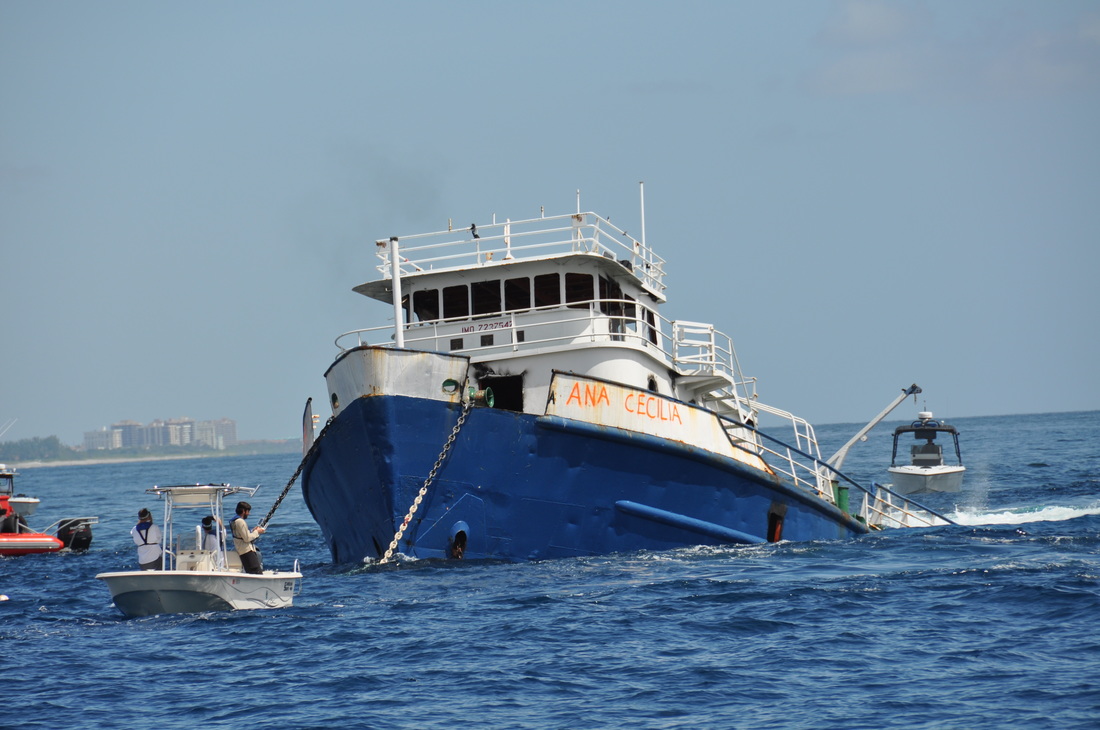Creating a Win-Win for Wildlife and Water Sports
|
By GERRY BARKER
North Palm Beach Life/ [email protected] Over her life, the ship Ana Cecilia experienced both fame and infamy. Once a cargo ship used by cocaine smugglers in Miami, she also was the first cargo ship to visit Cuba in 2012 after a 50-year embargo. This month, she went to her final glory. On July 13, the Ana Cecilia was sunk in 85 feet of water off Lake Worth Inlet to become the newest artificial reef in the Palm Beaches. The waters off Palm Beach County now host over 150 of these man-made reefs, and that's a good thing, according to Chuck Collins, Executive Director for the Marine Industries Association of Palm Beach County. "Artificial reefs are great," said Collins. "The fish start populating; they are great dive spots; they are great fishing areas and great for photography if you are into underwater photography or just exploring." Collins said typically three kinds of materials for used to create the reefs: Old ships, concrete and limestone, which support coral growth. The idea is place the reefs where coral isn't already there. The logistics and planning that go into that process is considerable. "You just don't go out there and blow a ship up," said Collins. "It has to be sunk in a very methodical manner. They don't use explosives hardly anymore. "They survey the area, drop the anchors, and make sure it is exactly where they want to put it. Then they have holes cut in the hull. They want to sink it in just the right manner because you don't want it turning upside down or turning on its side. You want it to set just right." Then's there's the clean-up. Ships earmarked for reefs have to thoroughly cleaned -- "no oil, no contaminants." Care has to be taken when using concrete as well, Collins noted. "You don't want it rolling around because it could negatively impact the bottom. You want it to be stable but have a lot of surface area to attract fish, with nooks and crannies for them to hide." All that cleaning, preparation and planning of course costs money, many times into the six-figures. Collins said funding comes from multiple sources, including "vessel registration fees, state and federal grants, donations from fishing tournaments, dive associations, corporations and individuals." He said the effort also gets non-funding support from businesses like Florida Power and Light, who allow materials to be stored on their property until they are ready to be shipped out for the reefs. Collins said the county has been active in the artificial reef program since 1985, and he sits on the artificial reef committee, along with representatives from Environmental Resource Management (ERM), fishing clubs and others. Working together, these groups not only expand the reefs, but also make improvements to the environment that has made Palm Beach a world-class destination. "They help create a better place for all of us to live. When you have that, the quality of life goes up, property values go up -- it's a win-win-win situation," said Collins. Related: Map of Palm Beach Artificial Reefs |
About Chuck Collins
Chuck Collins is the Executive Director for the Marine Industries Association of Palm Beach County. The MIAPBC is a not-for-profit organization created to promote and protect the sound growth of the marine industry in Palm Beach County for the benefit and education of its members, the community, and the environment. He has had numerous careers. In 1972 he began working for Walt Disney World Company in hospitality. He had many roles at WDW including serving as part of the team that opened EPCOT Center in 1982. From 1985 until 2004 he served in law enforcement investigating cases involving major resource violations, boating crashes, vessel theft, and title fraud. He has been declared an expert in boating crash reconstruction and accident investigation. Chuck has lectured extensively in these areas for numerous agencies and organizations including the International Association of Marine Investigators, IBEX, United States Coast Guard, United States Customs, FWC academy, Alaska State Law Enforcement, and other local law enforcement agencies. In 2004 Chuck was selected as FWC’s Officer of the year. That same year the Shikar-Safari Club International selected him as Florida’s Conservation Officer of the Year. In addition, in 2004 Chuck was named 2004 National Boating Law Enforcement Officer of the year. In his most recent position Chuck served as the South Florida Regional Director for the Florida Fish and Wildlife Conservation Commission (FWC). As Regional Director Chuck oversaw FWC operations in the 10 counties that comprise the FWC South Region. Chuck Collins received his Bachelor of Science in Public Administration from Barry University and his Masters of Business in Crisis Management from Florida Atlantic University |

